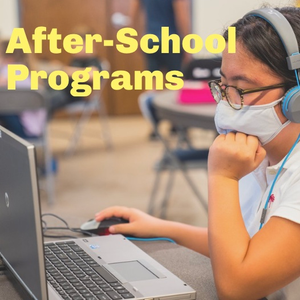JuiceWorks 3D
- Ashley Wenger

- Jan 26, 2023
- 5 min read
Updated: Feb 8, 2023
As a young boy, relentless ideator, and tinkerer, Andrei Dacko often found himself in trouble at school because his teachers and administrators didn’t understand his seemingly distracted learning style. Ironically, he later became a high school tech-elective teacher. It was during his time in academia that he began to realize that the traditional teaching model, teaching straight out of a textbook and evaluating students via standardized tests, was a broken system for education. Where was the real-world experience? Where was the practical application? His trials of being misunderstood by educators, combined with some additional experience in the manufacturing industry, fueled his mission to teach kids through project-based learning. Thus, Andrei left academia and built Juice Works 3D.
Juice Works 3D brings 3D digital skills to kids in the form of mobile after-school and summer camps. Based in Harrisonburg, VA, the program teaches kids ages 9 to 12 about digital design, digital fabrication, and automation. By educating kids outside of the classroom, Andrei is able to circumvent the traditional evaluation method of exams, and instead evaluate his students through skill-based learning and application. “It’s very student-centric. I want kids to be their own champions, be their own decision-makers and leaders in their learning journey,” Andrei said about his mission for the program. His drive to empower kids comes from his own frustrating history in school, “When I was in school, my teachers didn’t understand me. I wouldn’t be able to sit still and just read because I learned better when I was working with my hands and moving around. I was always doing my own thing, but I never knew it was called entrepreneurship, because my school didn’t teach that. If it had, I probably would’ve started my entrepreneurial journey a lot earlier in life.”
Andrei’s camps are offered in three different digital “technology tracks” which include: Computerized Numerical Control (CNC) milling, a subtractive manufacturing process, 3D Printing, an additive manufacturing process, and Robotics & Automation, “Each track is offered in two levels. Once a student graduates level one, they can advance to level two.” Andrei focuses on teaching hard skills, such as design process, measurement, CAD modeling, and programming, as well as soft skills like communication, teamwork, problem-solving, conflict resolution, and presentation, “My programming aims to hit a list of competencies that you would get graded on in school, but without the stress of grades, or the expectation for every kid to check the same box.” Standardized testing, an anxiety-inducing grading system, and lack of opportunity to think outside the box are key reasons why Andrei believes the education system is broken, “I had to leave the school system to make the type of change I’m seeking to make for the children that are our future.”
The name Juice Works 3D comes from taking the creative fuel, or “juice” as Andrei calls it, out of kids, and manifesting it into real work for our three-dimensional world, “The idea for the business, as it is now, came to me back in 2010, but the technology wasn’t where it needed to be. In 2016, the machinery I planned to use was finally advanced enough to be easily transported, and I could take it on the road with me.” Now, Andrei’s able to travel from schools to churches, to coworking spaces with his program, making it more accessible to all students across the Valley!
In the fall of 2019, Juice Works 3D ran its pilot program in seven schools. Andrei then purchased the first five robots for the program in March 2020 and launched the program the following June. Due to the restrictions of the Covid-19 pandemic, Andrei spent the rest of that year building and refining the Juice Works 3D curriculum. He was able to run the first official camp in March 2021, and since then has run three spring camps and seven summer camps, “In less than three years we’ve reached over 400 kids. To reach that amount of kids in a traditional school setting would take at least 20 years!” said Andrei, a testament to the program’s success.
In 2022, Andrei joined SCCF’s Startup Shenandoah Valley accelerator. He was a part of the fourth cohort, a unique group because it was focused on tech entrepreneurs. The program gave Andrei a sense of community amongst other entrepreneurs that he felt he had been missing, “I can be very introverted when working, so having the opportunity to poke my head outside of my business, and see who’s around to make connections with was great. The S2V program provided a forum for us to empathize, give advice, and support each other.” It also gave him a structure to work through problems with a mentor to guide him, “Having Logan Morris as a one-on-one mentor was really helpful and insightful in introducing me to potential solutions for my business. The other resources in the program helped push me outside of my comfort zone and actually begin to put things down on paper.” In addition to one-on-one mentoring, S2V gives entrepreneurs access to 8-weeks of business coaching, a Builder 10 Assessment, and the Asana management platform.
Beyond his own business goals, Andrei is enthusiastic about the opportunity and potential for tech in the Shenandoah Valley, “When I was scouting this area (Harrisonburg) to move here back in 2016, I felt like it was an area with an untapped capacity for innovation. It had the right type of people that are passionate about making change and weren’t worn out by it yet. I feel like right now the region is starting to hit its stride in that area.” Since moving to the area, Andrei has become a driving force in promoting the importance of tech opportunities for young kids. He has been in conversations with big-name tech companies like Riddleberger Brothers, Cadence, Merck, and Dynamic Aviation Group to support his mission, “I appreciate these companies taking a lead in the industry and supporting scholarships to bring our program to underserved students. It shows that they’re investing in their future talent, and setting an example for other industry leaders.” In addition to support from industry leaders, Juice Works 3D recently secured its first private school learning center partnership, “I’m really grateful that Ron Hoch, Head of School at the Redeemer Classic School, has embraced their STEM program and brought Juice Works 3D on for an entire year. We ran six camps there last fall, and will run another six this spring.” Looking ahead to 2023, Andrei looks forward to increasing these private school partnerships, raising more scholarship funds, and growing Juice Works 3D to offer a third level to his curriculum.
To learn more information about Juice Works 3D’s upcoming programs, visit www.juiceworks3d.com/register, or follow @juiceworks3d on Instagram or Facebook. If you’re interested in SCCF’s Startup Shenandoah Valley accelerator, applications are now open for cohort 6, which will begin in March 2023. Fill out the interest form for more information, the deadline to apply is February 2nd.
Subscribe to our newsletter for new stories every month!




















Comments